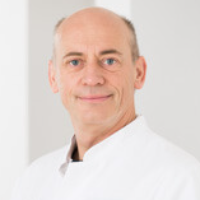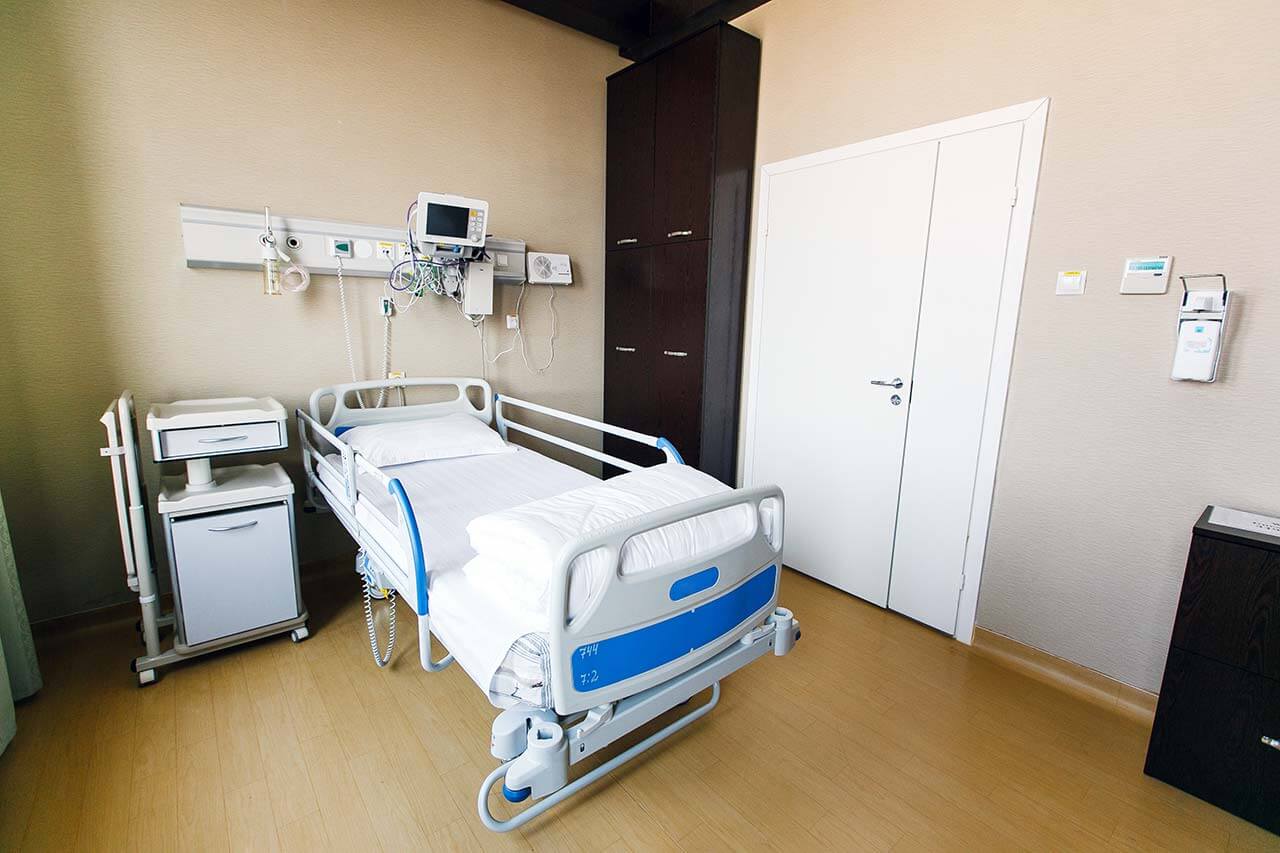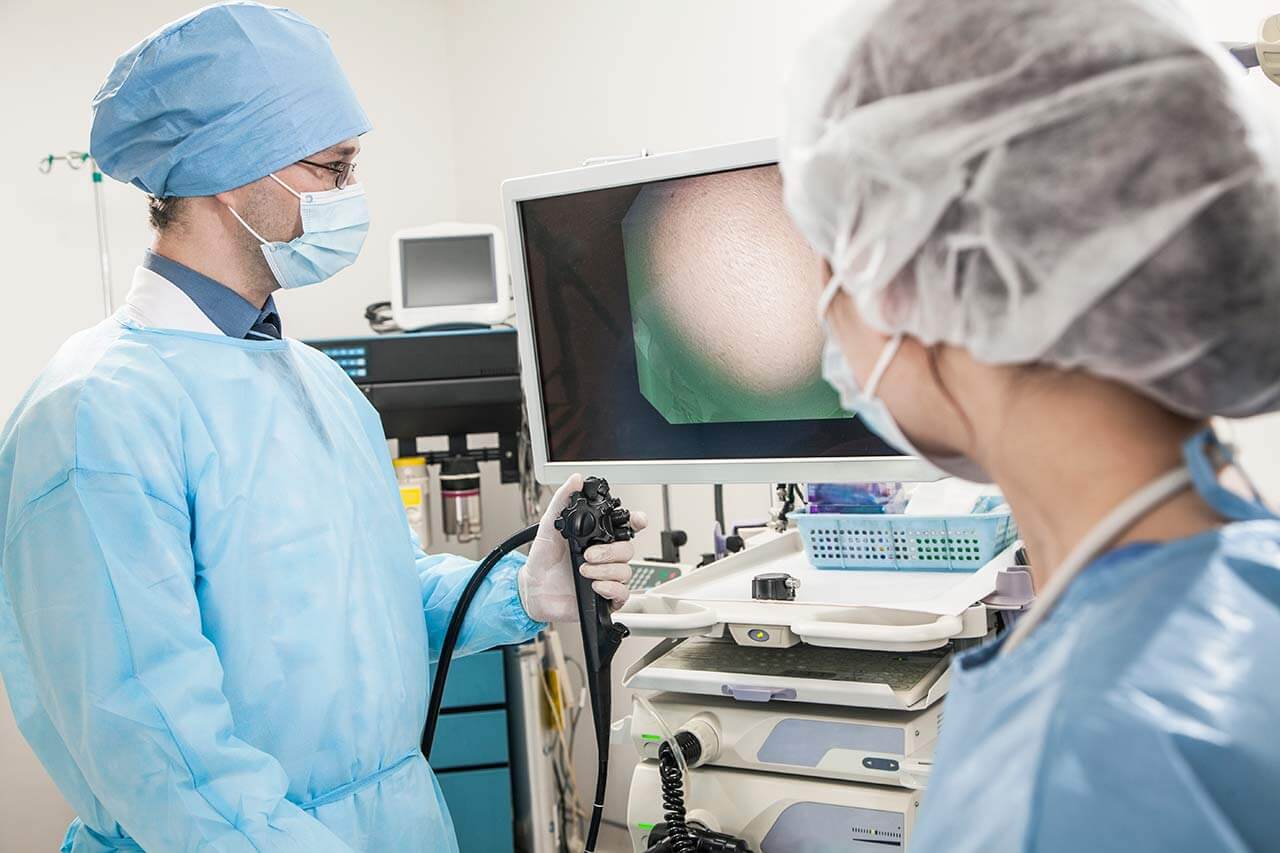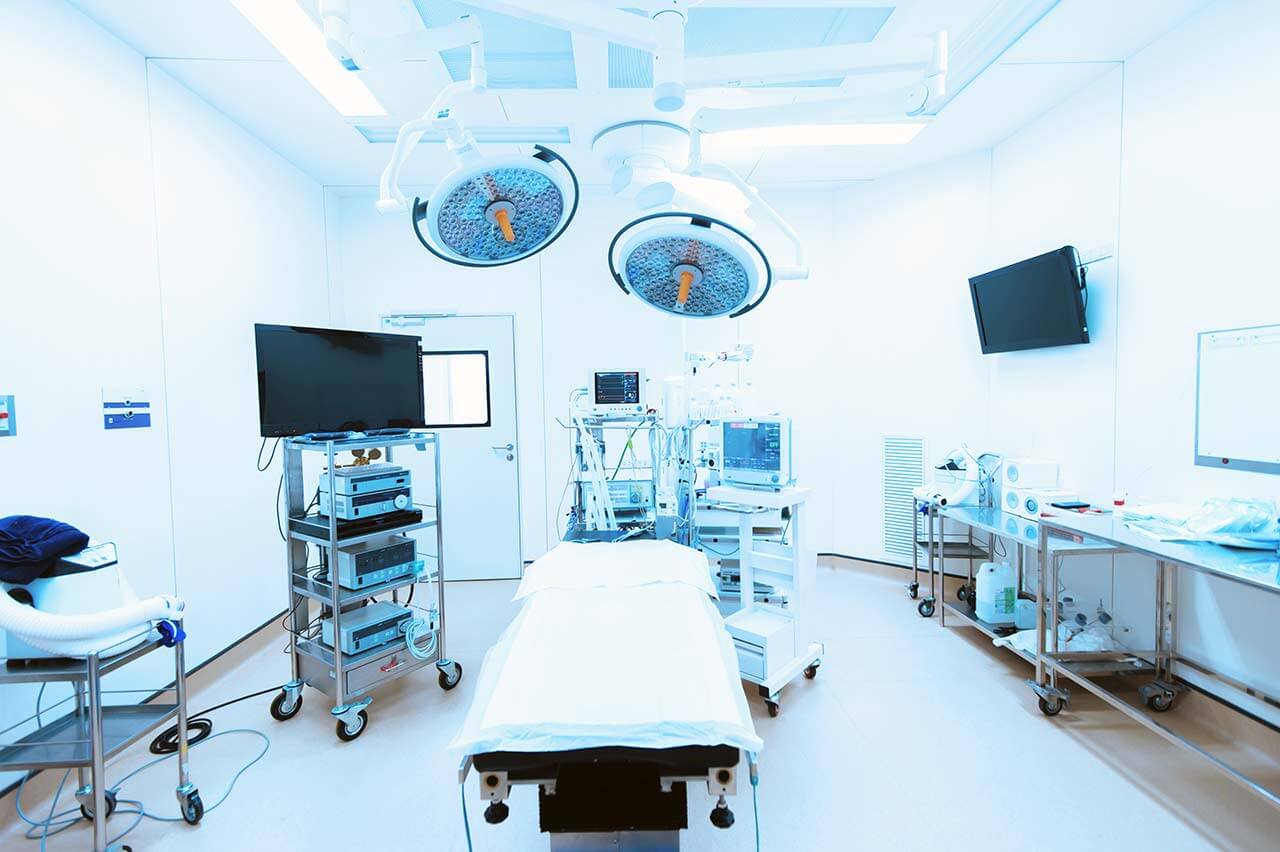
The program includes:
- Initial presentation in the clinic
- case history collection
- general clinical examination
- laboratory tests:
- complete blood count
- general urine analysis
- biochemical analysis of blood
- TSH-basal, fT3, fT4
- tumor markers (thyroglobulin (Tg),
Tg Antibody (TgAb)) - indicators of inflammation
- indicators blood coagulation
- thyroid ultrasound
- CT/MRI scanners of the neck
- thyroid scintigraphy
- biopsy and histological examination
- preoperative care
- thyroid resection with cervical lymph nodes excision
- symptomatic treatment
- cost of essential medicines
- nursing services
- stay in the hospital with full board (up to 6 days)
- full hospital accommodation
- elaboration further recommendations
Required documents
- Medical records
- MRI/CT scan (not older than 3 months)
- Biopsy results (if available)
Service
You may also book:
 BookingHealth Price from:
BookingHealth Price from:
About the department
The Department of General and Abdominal Surgery, Endocrine Surgery, Hepatopancreatobiliary Surgery and Hernia Surgery at the Luisenhospital Aachen specializes in performing a wide range of operations in the areas of its competence. The surgeons at the medical facility have a particular clinical interest in performing surgery for hernia repair, thyroid diseases, rectal diseases, and anal pathologies. These areas are certified by the German Cancer Society (DKG) and the German Society for General and Visceral Surgery (DGAV). The department houses several highly specialized centers, including the Colorectal Cancer Center, the Hernia Surgery Center, and the Center for Thyroid and Parathyroid Surgery. The department also has the status of a Competence Center for Minimally Invasive Surgery. The department's operating rooms have equipment for laparoscopic surgery, including advanced 3D technologies. The department has more than 25 years of experience performing sparing interventions that do not require any extensive skin and soft tissue incisions. The department has implemented a special Fast Track program aimed at achieving the fastest possible recovery for the patient in the postoperative period and their return to everyday life. With appropriate clinical indications, surgical interventions may be performed on an outpatient basis. The Head Physician of the department is Prof. Dr. med. Reinhard Kasperk.
The department's surgeons regularly demonstrate high treatment success rates in hernia repair surgery. Since 2012, the department has been certified as a highly specialized center by the German Hernia Society (DHG). The doctors operate on patients with inguinal, femoral, umbilical, incisional, and anterior abdominal wall hernias. More than 800 hernia repair surgical procedures of varying complexity are performed here every year. Hernia repair surgery is performed using minimally invasive techniques whenever possible, and in complex cases, surgeons use open or hybrid surgical techniques (a combination of open and laparoscopic techniques). The doctors also extensively use modern 3D technologies that ensure high safety of surgical manipulations.
The department houses the region's only Competence Center for Thyroid and Parathyroid Surgery, which was certified by the German Society for General and Visceral Surgery (DGAV). This certification is granted to only the best medical centers that regularly perform a large number of interventions with a very low complication rate. The team of endocrine surgeons has performed more than 2,500 interventions for thyroid diseases. The specialists perform over 200 operations on the thyroid gland and parathyroid glands every year. At the stage of diagnosis and planning of a surgical intervention, nuclear medicine specialists and otolaryngologists are often involved in the therapeutic process. As a rule, the department's doctors manage to perform minimally invasive surgery. When performing the intervention, intraoperative monitoring is used to prevent any damage to the recurrent laryngeal nerve. In most cases, a hospital stay after thyroid surgery is 2-3 days, and after 7-10 days, the patient visits the doctor on an outpatient basis. Following the surgical procedure, the specialists prescribe hormone replacement therapy to the patient.
Another primary focus of the department's clinical practice is rectal and anal surgery. Doctors admit patients with hemorrhoids, anal fissures, anal abscesses, and anal fistulas. The treatment of these pathologies usually requires a non-extensive and low-traumatic intervention on an outpatient basis. In addition, the specialists at the medical facility have vast experience in the treatment of fecal incontinence. Surgical interventions such as sphincteroplasty or sacral neuromodulation often ensure the best therapeutic results.
The department's therapeutic options are complemented by providing medical care to patients with colon cancer, which is an aggressive and life-threatening type of oncology. Colon polyps are a precancerous condition for this type of cancer, so when polyps are detected during colonoscopy, they must be removed. If cancer is detected in the early stages, patients receive the most sparing treatment and have the best chance of recovery. In advanced stages of colon cancer, it is impossible to do without a surgical intervention to resect the malignant tumor or part of the intestine. As a rule, a treatment regimen includes conservative methods such as chemotherapy, radiation therapy, hormone therapy, immunotherapy, and others. The optimal complex of therapeutic measures is prescribed on an individual basis after considering the patient's diagnostic results at the interdisciplinary tumor board.
The department's range of surgical services includes:
- General and abdominal surgery
- Surgery for stomach diseases: ulcers, polyps, malignant tumors, and bleeding
- Surgery for esophageal diseases: gastroesophageal reflux disease and esophageal cancer
- Surgery for colon diseases: inflammatory bowel disease, diverticular disease, polyps, and colon cancer
- Endocrine surgery
- Surgery for thyroid diseases
- Surgery for parathyroid diseases
- Surgery for adrenal diseases
- Hepatopancreatobiliary surgery
- Surgery for liver diseases: jaundice, liver cysts, benign liver tumors, and liver cancer
- Surgery for gallbladder and bile duct diseases: gallstone disease, gallbladder cancer, and biliary stricture or obstruction
- Surgery for pancreatic diseases: pancreatic cysts, acute and chronic pancreatitis, and pancreatic cancer
- Hernia surgery
- Surgery for inguinal, femoral, umbilical, incisional, and anterior abdominal wall hernias
- Other medical services
Curriculum vitae
Professional Career
- 1982 - 1983 Military Service, Physician.
- 1983 Doctorate, University of Kiel.
- 1983 - 1987 Surgeon, Department of Surgery, University Hospital Duesseldorf.
- 1988 Surgeon, Department of Surgery, University Hospital RWTH Aachen.
- 1990 Board certification in Surgery.
- 1995 Habilitation and Venia Legendi (PD); Senior Physician, Department of Surgery, University Hospital RWTH Aachen; additional qualification in Sports Medicine.
- 1998 Managing Senior Physician, Department of Surgery, University Hospital RWTH Aachen.
- 1999 Specialization in Abdominal Surgery.
- 2000 Extraordinary Professorship, Deputy Head of the Department of Surgery, University Hospital RWTH Aachen.
- 2002 Head Physician, Department of Surgery, St. Johannes Hospital Duisburg.
- 2003 Head Physician, Department of Surgery, St. Barbara Hospital Duisburg.
- 2007 Director, Competence Center for Colorectal Surgery, Catholic Hospital Duisburg.
- Since 2010 Head Physician, Department of General and Abdominal Surgery, Endocrine Surgery, Hepatopancreatobiliary Surgery and Hernia Surgery at the Luisenhospital Aachen.
Clinical Focuses
- Esophageal and stomach surgery.
- Rectum, small, and large intestine surgery.
- Pancreatic surgery.
- Hernia repair surgery.
- Minimally invasive surgery.
Research Interests
- Pancreatic surgery.
- Rectal functional surgery.
- Cancer surgery.
Photo of the doctor: (c) Luisenhospital Aachen
About hospital
The Luisenhospital Aachen is a modern health facility that offers top-class European-standard service. The medical complex is an academic hospital of RWTH Aachen University, which provides patients with access to innovations in diagnosis and treatment. The hospital first opened its doors to patients in 1967 and has been carrying out a successful clinical practice for more than 155 years.
The hospital has 15 specialized departments, each of which employs a team of experienced and competent specialists who prioritize patients' health. The main areas of clinical activity at the hospital are general surgery, abdominal surgery, thoracic surgery, vascular surgery, plastic surgery, gastroenterology, cardiology, endocrinology, gynecology, obstetrics, mammology, traumatology, and orthopedics.
More than 17,000 inpatients and about 37,600 outpatients are treated in the hospital every year. The team of physicians consists of more than 160 specialists, while the nursing staff consists of about 500 employees. It is noteworthy that the hospital's doctors regularly admit patients from abroad, so the hospital has gained unique experience in working with international patients.
The hospital provides patients with all the necessary conditions for maximum comfort. The medical staff strives to surround the patient with care and take into account their individual needs. The basis of the work of the hospital's team lies in its own slogan: "Thorough care for a patient and their needs". The good reputation of the hospital in the European medical arena and the constant growth in the number of people wishing to be treated here are the best evidence of the excellent medical care provided here.
Photo: (с) depositphotos
Accommodation in hospital
Patients rooms
The patients of the Luisenhospital Aachen live in comfortable single and double rooms. The standard patient room furnishings include an automatically adjustable bed, a bedside table with a pull-out tray, a wardrobe, a table, chairs, a TV, and a telephone. Each patient room has an ensuite bathroom with a shower and a toilet.
Patients are also offered accommodation in enhanced-comfort rooms. Such patient rooms have a more sophisticated design and are additionally equipped with a safe, a mini-fridge, and a cozy space with upholstered furniture.
Meals and Menus
Patients in the hospital are offered three tasty and balanced meals a day. Patients have a choice of three set menus, including dietary ones. If, for some reason, you do not eat all the foods, you will be offered an individual menu. Please inform the medical staff about your dietary preferences prior to treatment.
There is a cozy cafe, Caféhaus Luise, on the ground floor of the hospital, where patients can enjoy delicious main courses, snacks, pastries, cakes, and pies. The cafe also offers a wide range of hot and cold drinks. In the warm season, patients can have lunch, snacks, or enjoy a cup of coffee or tea with dessert on the beautiful terrace.
Further details
Standard rooms include:
Religion
The hospital has a special hall where Catholic and Evangelical worship is held every Sunday morning. It is also a place of solitude for prayer on any day and at any time of day.
The services of representatives of other religions are available upon request.
Accompanying person
Your accompanying person may stay with you in your patient room or at the hotel of your choice during the inpatient program.
Hotel
You may stay at the hotel of your choice during the outpatient program. Our managers will support you for selecting the best option.





